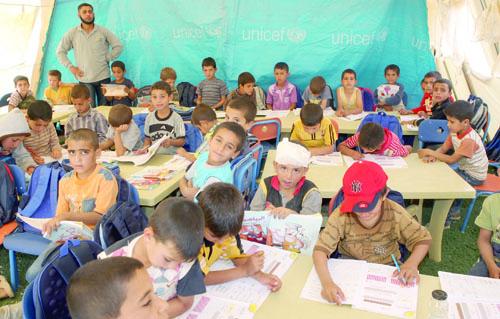You are here
All children in camps will have access to education, despite funding shortfall — UNICEF
By Suzanna Goussous - Aug 01,2018 - Last updated at Aug 02,2018

UNICEF expanded its educational services for both camps this year, through new classrooms, transportation and school supplies among others services (Photo by Suzanna Goussous)
AZRAQ — Around 28,000 school students from Zaatari and Azraq refugee camps are currently preparing for a new academic year, despite recent reports of a lack of funding for the positions of teaching assistants inside the camps, according to UNICEF Jordan.
“UNICEF will continue to ensure that all children have access to education and we are working very closely with the Ministry of Education and their partners to ensure that schools open on time, with the same quality of education maintained,” UNICEF Representative to Jordan Robert Jenkins told The Jordan Times.
Jenkins stressed that, despite the shortfall in funding, the agency is working with the ministry to make education accessible to all children residing in camps.
“UNICEF currently does not have funding for teaching assistants, but we will continue to fundraise and we are very optimistic that we will be able to continue the teaching assistants’ work in September,” he continued.
UNICEF received only 57 per cent of the funding allocated for the agency in 2018, which forced the agency to cut down some projects. However, despite these financial challenges, UNICEF will “make sure that all school-aged children are registered and admitted into schools”, UNICEF Jordan stressed.
Under the shortfall of funding, the agency is working towards securing funding for all education-related programmes, a UNICEF statement sent to The Jordan Times said.
For the time being, UNICEF is in need of $12.5 million to continue providing educational services and related activities to refugee children in the camps for the upcoming academic year, the statement said.
Since 2012, UNICEF has secured education for Syrian refugees residing in the Zaatari refugee camp, and in the Azraq camp since it started operating in 2014, with an equal access to education for all, according to the statement.
This year, the support of partners and donors of the agency helped the agency expand its educational services for both camps by constructing new classrooms, providing necessary requirements for children to continue their education, including kindergartens, transportation services, school supplies, new infrastructure and toilet facilities.
UNICEF also enhanced inclusive education for children with special needs, in addition to providing remedial education for higher quality education and catch-up sessions for drop-out refugee children, to guarantee all children stay in school, the statement concluded.
Related Articles
Despite financial constraints and overcrowding in schools across the Kingdom, UNICEF and the Education Ministry on Tuesday reiterated their commitment to ensuring that all children in Jordan are provided access to learning opportunities.
AMMAN — UNICEF is committed to enabling all children on Jordan’s soil to access education and learning, but both the Jordanian government an
AMMAN — South Korea announced on Monday that it would contribute $600,000 to support the implementation of Makani activities by UNICEF Jorda

















